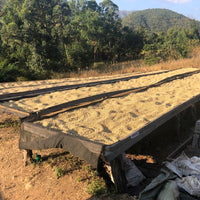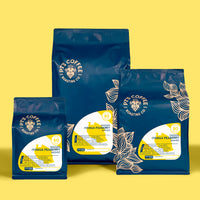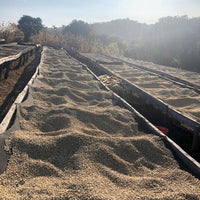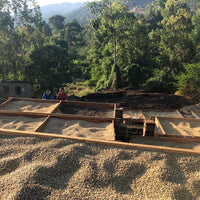Tanzania
Iyenga AMCOS Peaberry Washed
Peach, Malt, Ruby Red Grapefruit




Tanzania
Iyenga AMCOS Peaberry Washed
Peach, Malt, Ruby Red Grapefruit
This juicy coffee introduces itself with aromas of peach rings, navel orange, and hops. In the cup, we detected notes of peach and elderflower alongside malty sweetness and ruby red grapefruit acidity. Toffee and sage notes emerge in the finish.
This coffee was a July 2024 Roaster's Choice selection.
Producer: Iyenga AMCOS
Farm: 193 Smallholders
Region: Songwe
Altitude: 1,675-1,900 masl | 5,495-6,234 feet
Varietal: Bourbon, Jackson Bourbon
Process: Washed
Roast: Light-Medium
Notes: Peach, Malt, Ruby Red Grapefruit
Imported by our friends at Crop to Cup:
"Founded in the wake of the Tanzanian Cooperative Act of 2003, Iyenga AMCOS (Agricultural Marketing Cooperative Society) now has 193 registered members. These are smallholders, none farming more than 5 hectares. Most members are within a short walk of the washing station. Still, during harvest the group organizes trucks and motorbikes to pick up cherry and make sure that all is pulped within 8 hours of harvest. A government-granted Penagos UCBE 500 depulper helps conserve water, which is critical in this area. Access to water is one of Iyenga’s biggest challenges, especially during the dry season. Conversations during annual meetings include ideas for damming a local river or creating a rainwater reservoir.
"Iyenga’s elected board has a reputation for capable management, as evidenced by their collection services and pulping standards. They have proven their ability to work towards long-term goals, and have taken on quality as their next objective.
"Because of this, Iyenga is starting to build a name for itself based on quality—in 2019 they won the Taste of Harvest Competition with their AA and PB (peaberry) coffees. One of our projects with them now is to expand drying bed capacity—a bottleneck in quality production, and necessary for our goal of increasing drying times."
Peaberries are the result of a natural mutation in which only one of two seeds inside the coffee cherry is fertilized. Instead of two coffee beans with flat faces and round backs developing within the cherry, a single rounded bean is the result.
Peaberries constitute a small percentage of each harvest and they are typically sorted into peaberry-only lots for consistency during the roasting process, as they are denser than regular coffee beans.




